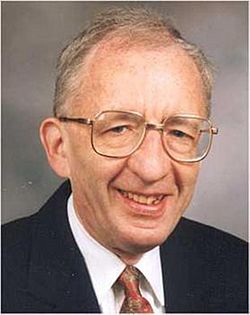Alan Baker (mathematician) facts for kids
Quick facts for kids
Alan Baker
|
|
|---|---|
 |
|
| Born | 19 August 1939 London, England
|
| Died | 4 February 2018 (aged 78) Cambridge, England
|
| Alma mater | University College London University of Cambridge |
| Known for | Number theory Diophantine equations Baker's theorem Baker–Heegner–Stark theorem |
| Awards | Fields Medal (1970) Adams Prize (1972) |
| Scientific career | |
| Fields | Mathematics |
| Institutions | University of Cambridge |
| Thesis | Some Aspects of Diophantine Approximation (1964) |
| Doctoral advisor | Harold Davenport |
| Doctoral students | John Coates Yuval Flicker Roger Heath-Brown David Masser Cameron Stewart |
Alan Baker was a brilliant English mathematician. He was famous for his amazing work in a field called number theory. This part of math deals with the properties and relationships of numbers. He was especially known for finding "effective methods" to solve tough math problems. He won the prestigious Fields Medal, which is like the Nobel Prize for mathematicians, in 1970.
Life of a Math Whiz
Alan Baker was born in London, England, on August 19, 1939. He went to Stratford Grammar School. Later, he studied mathematics at University College London and then at Trinity College, Cambridge. At Cambridge, he earned his PhD, which is a very high university degree. His teacher there was another famous mathematician, Harold Davenport.
In 1970, when he was just 31 years old, Alan Baker visited a special research center called the Institute for Advanced Study. It was during this time that he received the Fields Medal. This award is given every four years to outstanding mathematicians under 40.
In 1974, he became a professor of pure mathematics at Cambridge University. He held this important job until 2006. After that, he became a professor emeritus, meaning he was still connected to the university even after retiring. He was also a fellow of Trinity College from 1964 until he passed away in 2018.
Alan Baker was very interested in different parts of number theory. This included studying transcendental numbers, which are numbers that are not the root of any non-zero polynomial equation with integer coefficients. He also worked on Diophantine equations, which are math problems where you are looking for whole number solutions.
In 2012, he became a fellow of the American Mathematical Society. This is a group for top mathematicians in America. He was also made a foreign fellow of the National Academy of Sciences, India.
Alan Baker's Discoveries
Alan Baker made very important contributions to number theory. One of his biggest achievements was making a famous math rule, the Gelfond–Schneider theorem, even more powerful. This theorem helped solve one of Hilbert's famous math problems.
Baker's work helped solve many other problems in number theory. For example, he contributed to the Gauss class number problem. He also helped find solutions to Diophantine equations, like the Mordell curve. His methods were very useful for finding exact answers to these complex math problems.
Honours and Awards
- 1970: Fields Medal
- 1972: Adams Prize
- 1973: Fellowship of the Royal Society
See also
 In Spanish: Alan Baker para niños
In Spanish: Alan Baker para niños
 | Sharif Bey |
 | Hale Woodruff |
 | Richmond Barthé |
 | Purvis Young |

